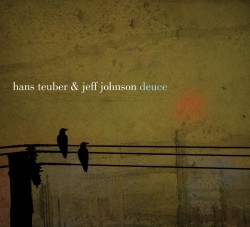MUSIC REVIEW BY Ian Gwin, Earshot Jazz
Veterans of the Seattle scene and kindred "wise musical souls," saxophonist Hans Teuber and bassist Jeff Johnson have aptly named their duo debut. The etymology of "deuce" traces back to the number two, but along the way has picked up the spice of the devil and the underworld aura of the gambling den: like rolling snake eyes, a deuce pins the player at their own game. Similarly, in Deuce, Teuber and Johnson lay down all their cards. With cunning turns of phrase, their swinging dialogue always seems to come to draws, sounding like the politic conversations of two close travelers on the whims of luck, the winds of change, and the ways of chance.
Like any good match, Teuber and Johnson play on one another's unique strengths. Teuber takes the upper register with his spiraling, boppishly decorative approach on tenor and alto saxophones, where Johnson joins him with his earthy melodies, double stops, and melodic slaps, sometimes doubled by the horn's clapping pads. In its cool formal approach, the duo's co-written original material—taking up most of the album—appropriately brings out the instrumentalists' faculty for both song and sound. For "Hummingbirds" and "Let's Pretend," Johnson reveals his quick yet harmonically fine bowing, whereas Teuber tests a thin line between the horizontal motion of his melodies and the vertical of overtone clusters. For their aptly titled "Hot Rod," based on a slick blues theme, Johnson cruises with guitaristic string vamps and quick switches, with Teuber's fluttering lines running with it like a motor's moving parts.
Apart from their own material, the duo treats a few classic ballads, but remodels them in their own unbridled, swinging renditions; thus the pleading ode of Irving Berlin's "How Deep is the Ocean?" becomes a playfully acrobatic burlesque, while the late-night advance of Bob Haggard's "What's New?" changes its setting from a lush ball to a bustling street somewhere downtown. The grit and grime of the blues, however, always lurks somewhere in the distance, stepping out on a notable cover of Jimmy Reed's "Bright Lights, Big City." Though they only outline the pounding rhythm of the original, its fundamental rock comes out in the almost palpable snap of strings and shiver of grace notes.
Just as any great solo performer can convey the size and complexity of a full band from a just a few key resources, Teuber and Johnson handle their material together like a full band. At the same time, the indicative space they create between one another produces an intimacy which reinforces the sensitive, telling, and sometimes wild convictions of two of Seattle's greats.
Like any good match, Teuber and Johnson play on one another's unique strengths. Teuber takes the upper register with his spiraling, boppishly decorative approach on tenor and alto saxophones, where Johnson joins him with his earthy melodies, double stops, and melodic slaps, sometimes doubled by the horn's clapping pads. In its cool formal approach, the duo's co-written original material—taking up most of the album—appropriately brings out the instrumentalists' faculty for both song and sound. For "Hummingbirds" and "Let's Pretend," Johnson reveals his quick yet harmonically fine bowing, whereas Teuber tests a thin line between the horizontal motion of his melodies and the vertical of overtone clusters. For their aptly titled "Hot Rod," based on a slick blues theme, Johnson cruises with guitaristic string vamps and quick switches, with Teuber's fluttering lines running with it like a motor's moving parts.
Apart from their own material, the duo treats a few classic ballads, but remodels them in their own unbridled, swinging renditions; thus the pleading ode of Irving Berlin's "How Deep is the Ocean?" becomes a playfully acrobatic burlesque, while the late-night advance of Bob Haggard's "What's New?" changes its setting from a lush ball to a bustling street somewhere downtown. The grit and grime of the blues, however, always lurks somewhere in the distance, stepping out on a notable cover of Jimmy Reed's "Bright Lights, Big City." Though they only outline the pounding rhythm of the original, its fundamental rock comes out in the almost palpable snap of strings and shiver of grace notes.
Just as any great solo performer can convey the size and complexity of a full band from a just a few key resources, Teuber and Johnson handle their material together like a full band. At the same time, the indicative space they create between one another produces an intimacy which reinforces the sensitive, telling, and sometimes wild convictions of two of Seattle's greats.
Soundclips
Other Reviews of
"Deuce":
Rifftides by Doug Ramsey
Jazz Weekly by George W. Harris
All About Jazz by Paul Rauch
All About Jazz by Dan McClenaghan
Midwest Record by Chris Spector
